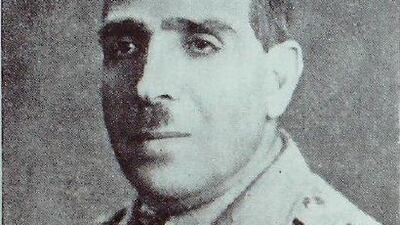My late grandfather, Abdul-Jabbar Al Rawi, was the perfect civil servant. Born at the turn of the 20th century in the town of Rawa on the banks of the Euphrates, which was then part of the Ottoman Empire, he was a nation builder.
As an officer in the Arab army that defeated the Ottomans during the First World War, he fought for the chance to form a government for all Arab people.
A few years later, these ambitions were focused on serving the first Iraqi national government.
From his early career in the Iraqi police force under the British mandate to his time as a senior government official during the monarchy, his main thought was to support the development of a nation that his people could be proud of.
He never cared about personal advancement beyond what his own accomplishments meant for the wider goal of making the modern Iraq.
My grandfather never doubted that his generation would have to prove itself every step of the way and that ensuring Iraq would be governed by Iraqis was a matter of collective will – each person would have to do their duty.
He was also determined to show that Iraqis were as competent as any other nationality.
To this end, he barely acknowledged the British advisors who were there as part of Britain’s administration of Iraq in the 1920s.
My grandfather was the cause of much fury among these men, including the highly-respected John Bagot Glubb, also known as Abu Hunaij or Glubb Pasha, who would resign from his post in Iraq in 1930 after his orders were countermanded.

My grandfather cared little about their complaints, however, because he knew he was competent and dedicated in his duties. To co-operate with them, even out of politeness, would have – to his mind – undermined the very idea that Iraq could function independently of British support.
It was a matter of a deep and personal honour for him and many of his contemporaries. They endeavoured so that Iraqis could live and work in dignity.
If my grandfather’s inflexibility jars today, it is worth remembering that at the time Arabs could take nothing for granted. There had been too many setbacks and disappointments following the successful revolt against the Ottomans. TE Lawrence, ‘Lawrence of Arabia’, was a case in point.
In his letters from the 1920s and '30s, which are being auctioned this week by Sotheby’s, Lawrence comes across as a jaded figure.
Writing to one of his friends from the war, Lawrence said: “After you left us the Arab Adventure got rather too black and heavy and the gaiety died out: while the end of it left a nasty taste in my mouth. Hence partly my disgust for my war personality!”
The Times of London wrote just this month: "Lawrence secured his place in the history books as a great strategist of the British-backed Arab revolt against Ottoman rule during the First World War."
My grandfather would disagree with the outsized perception of Lawrence’s role.
Two generations of my family are working together to translate, from Arabic into English, his memoirs. He does mention Lawrence in his memoirs in one, almost cursory, line:
“With the northern Arab army [led by Prince Faisal] is an English officer called Lawrence. He has earned a wide reputation among the Bedouins because he used to travel with them and is familiar with their habits, wore their clothes and endured the hardship of Bedouin life.”
Not exactly the heady stuff that would make David Lean’s epic 1962 film such a classic. My grandfather’s viewpoint is a clear Arab’s lens on the past. He contends, rightly, that it was not a lone Englishman who determined their fate but their own actions.
Lawrence himself understood that this romanticism could be damaging: “The Arab show looks uglier as I get away from it and I’m determined not to exploit it any more. I didn’t much, you know, at the time: for instance I hadn’t any pay, then, or during the [Paris] Peace Conference, or with Winston [Churchill] lately. It’s been seven years, living on my hump, and the hump has melted into my ribs.”
Certainly, the writings of Abdul-Jabbar Al Rawi provide an antidote to any romanticised view of the region’s past. He described the lands between Iraq and Syria as a place where tribes raided each other relentlessly and looters regularly robbed and murdered travellers on the road. Water was often scarce and the summers were infested with insects.
He described the early days of the oil industry when the streets of the oil towns were sprayed with the black stuff. There was also beauty and abundance. There were brilliant men too, whether educated or not. Many were also hospitable and wise.
As my grandfather wrote of one such person: “Sheikh Ajeel [the chief of sheikhs of the Shammar tribe] is tall, of good appearance and manners, well-liked and of good reputation among the tribes, as he was successful in leading tribal raids and conducted well the distribution of the booty. That success and good fortune accompanies him even after he becomes sheikh. This man is fortunate... despite being illiterate (he) worked hard to learn how to write his signature”.
In such individuals could be found the building blocks for a fledgling country.
To either catastrophise or romanticise a certain period of time warps the truth and strips people of that time of their hard-earned dignity.
Even today, we can, like my grandfather did, love Iraq and its people with a pure heart – without the need to see it as any other way than it is.
Mustafa Alrawi is an assistant editor-in-chief at The National


